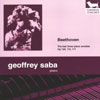Beethoven 32 Variations; Piano Sonatas Nos 1, 26 & 32
Lyrical late Beethoven but some more dramatic abandon would not come amiss
View record and artist detailsRecord and Artist Details
Composer or Director: Ludwig van Beethoven
Genre:
Instrumental
Label: Carnegie Concerts
Magazine Review Date: 1/2009
Media Format: CD or Download
Media Runtime: 0
Mastering:
Stereo
Catalogue Number: CC010

Tracks:
| Composition | Artist Credit |
|---|---|
| Sonata for Piano No. 30 |
Ludwig van Beethoven, Composer
Geoffrey Saba, Piano Ludwig van Beethoven, Composer |
| Sonata for Piano No. 31 |
Ludwig van Beethoven, Composer
Geoffrey Saba, Piano Ludwig van Beethoven, Composer |
| Sonata for Piano No. 32 |
Ludwig van Beethoven, Composer
Geoffrey Saba, Piano Ludwig van Beethoven, Composer |
Composer or Director: Ludwig van Beethoven
Genre:
Instrumental
Label: Hevhetia
Magazine Review Date: 1/2009
Media Format: CD or Download
Media Runtime: 0
Mastering:
Stereo
Catalogue Number: HV0028-2 331

Tracks:
| Composition | Artist Credit |
|---|---|
| (32) Variations on an Original Theme |
Ludwig van Beethoven, Composer
Ludwig van Beethoven, Composer Miki Skuta, Piano |
| Sonata for Piano No. 1 |
Ludwig van Beethoven, Composer
Ludwig van Beethoven, Composer Miki Skuta, Piano |
| Sonata for Piano No. 26, 'Les adieux' |
Ludwig van Beethoven, Composer
Ludwig van Beethoven, Composer Miki Skuta, Piano |
| Sonata for Piano No. 32 |
Ludwig van Beethoven, Composer
Ludwig van Beethoven, Composer Miki Skuta, Piano |
Author: Jed Distler
In Op 111, I acknowledge the unusual clarity and point with which Skuta unravels the Arietta’s rumbling left-hand textures. However, one would welcome a wider range of dynamics and dramatic abandon, both here and in Geoffrey Saba’s live traversals of the last three Beethoven sonatas. Saba seems primarily a gentle, lyrical pianist intent on softening the blow of Beethoven’s blunt edges, such as in the Op 110 Allegro molto’s difficult-to-voice syncopations. He often relaxes the basic pulse in Op 109’s opening movement and third movement theme, Op 110’s Klagender Gesang, and in Op 111’s Arietta to the point where the music’s long lines nearly slip away. Still, Saba is incapable of producing an ugly sound and his sensitive, intelligent musicianship falls easily on the ear.
Discover the world's largest classical music catalogue with Presto Music.

Gramophone Digital Club
- Digital Edition
- Digital Archive
- Reviews Database
- Full website access
From £8.75 / month
Subscribe
Gramophone Full Club
- Print Edition
- Digital Edition
- Digital Archive
- Reviews Database
- Full website access
From £11.00 / month
Subscribe
If you are a library, university or other organisation that would be interested in an institutional subscription to Gramophone please click here for further information.




